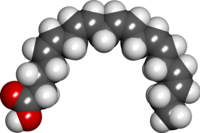
Photo from wikipedia
CONTEXT Omega-3, a long-chain polyunsaturated fatty acid (LC-PUFA), may help promote healthy sleep outcomes. However, evidence from randomized controlled trials are inconclusive. OBJECTIVE The objective of this systematic review and… Click to show full abstract
CONTEXT Omega-3, a long-chain polyunsaturated fatty acid (LC-PUFA), may help promote healthy sleep outcomes. However, evidence from randomized controlled trials are inconclusive. OBJECTIVE The objective of this systematic review and meta-analysis was to explore the impact of omega-3 LC-PUFA supplementation and related dietary intervention in clinical trials as well as omega-3 LC-PUFA exposure in longitudinal studies on human's sleep-related outcome. DATA SOURCES The PubMed, EMBASE, Cochrane Library, CINAHL, and AMED databases were searched from inception to November 2019. Randomized controlled trials, clinical trials that included a control group, and longitudinal studies that reported the intake of omega-3 LC-PUFA and sleep-related outcomes were included. STUDY SELECTION A total of 20 studies with 12 clinical trials and 8 longitudinal studies were identified for inclusion. DATA EXTRACTION Participant characteristics, study location, intervention information, and sleep-related outcome measurements were reported. Included studies were appraised with Cochrane risk-of-bias tools and the Newcastle-Ottawa Scale. Weighted mean differences (WMDs) and 95%CIs were pooled with fixed or random effect models. RESULTS Omega-3 LC-PUFA may improve infants' sleep organization and maturity. It reduced the percentage of infants' active sleep (WMD = -8.40%; 95%CI, -14.50 to -2.29), sleep-wake transition (WMD = -1.15%; 95%CI, -2.09 to -0.20), and enhanced the percentage of wakefulness (WMD = 9.06%; 95%CI, 1.53-16.59) but had no effect on quiet sleep. Omega-3 reduced children's total sleep disturbance score for those with clinical-level sleep problems (WMD = -1.81; 95%CI, -3.38 to -0.23) but had no effect on healthy children's total sleep duration, sleep latency, or sleep efficiency. No effectiveness was found in adults' total sleep duration, sleep latency, sleep efficiency, sleep quality, or insomnia severity. CONCLUSION Omega-3 LC-PUFA may improve certain aspects of sleep health throughout childhood. Additional robust studies are warranted to confirm the relationship between omega-3 LC-PUFA and sleep.
Journal Title: Nutrition reviews
Year Published: 2020
Link to full text (if available)
Share on Social Media: Sign Up to like & get
recommendations!